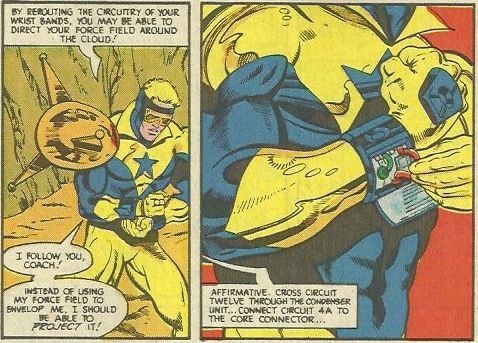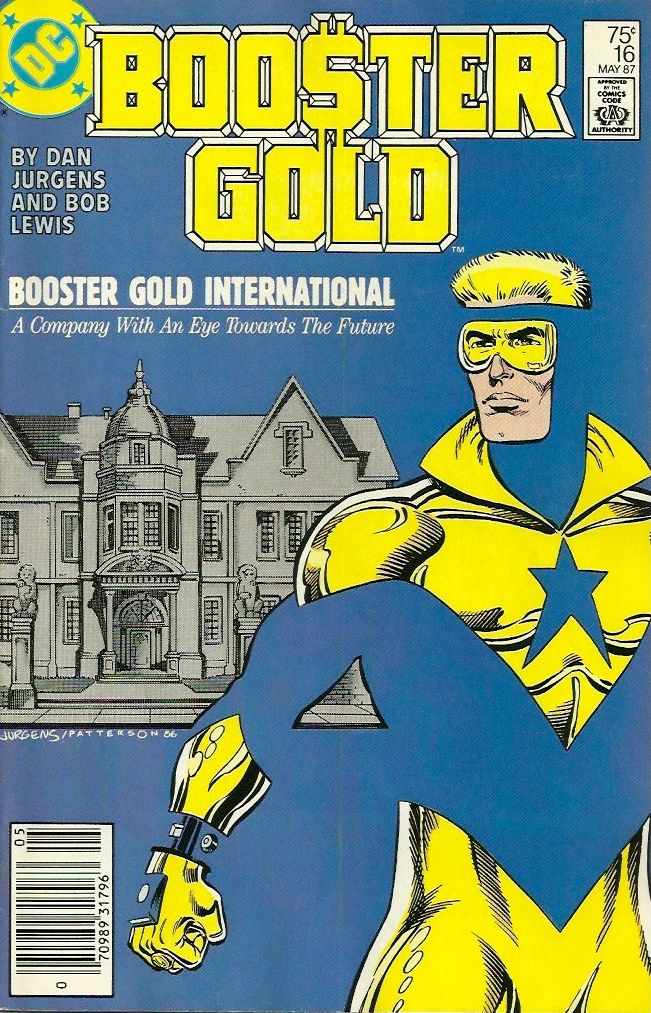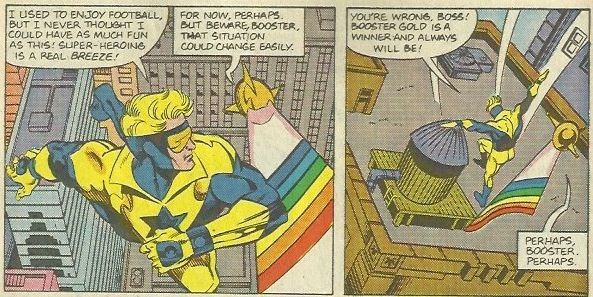A column in which Matt Derman (Comics Matter) reads & reviews comics from 1987, because that’s the year he was born. Click here for an archive of all the previous posts in the series.
Booster Gold #13-22 (DC) by Dan Jurgens, Gary Martin (#13), Mike DeCarlo (#14, 18), Bruce D. Patterson (#15), Bob Lewis (#16), Arne Starr (#17, 20), Al Vey (#19), Ty Templeton (#21-22), Gene D'Angelo (#13-15, 17-22), Bob Lappan (#13, 17), John Costanza (#14, 18), Agustin Mas (#15), Albert de Guzman (#16), Duncan Andrews (#19), Steve Haynie (#20-22), Barbara Randall
Booster Gold is kind of a jackass. My previous exposure to the character had always been in the context of the Justice League, so I knew he was cocky, but the true depths of his self-importance surprised me when reading his solo title. Yes, I was aware of his origins as a former star athlete from the future who stole technology from his own time, brought it to our own, and used it to make himself into a superhero. None of that screams altruism, so I suppose I could've expected the brash, reckless, in-love-with-himself hero I got, but for whatever reason it caught me off-guard at first. I guess I had always assumed that since he was a professional superhero, he must have a strong core goodness that would trump his immaturity and arrogance when it mattered. In reality, his self-interest is his core, and any genuine goodness that results does so almost in spite of his personality. He likes the superhero lifestyle, but his enjoyment comes first from the thrill and then from the fame, with any satisfaction he gets from actually helping someone or fighting evil being largely incidental. He's not a bad person; he has loose morals that guide him and the hint of a sincere desire to be better and do more. Yet all of that keeps getting overshadowed by his continued focus on maintaining his public image, getting rich, womanizing, and having fun.
Within the comic, Booster's flaws are no secret, and indeed they seem to be the main point of the character. He's practically a gimmick, a superhero who is so unlike his peers (and so much like a spoiled child) it's a wonder he ever gets any heroing done at all. Though not strictly a comedic title, Booster Gold is sort of one big joke, asking and answering the question of, "What if superheroes weren't fit for their self-appointed jobs?" Booster is basically Bruce Wayne without Batman, the wealthy playboy persona sticking around even when the costume's on. He also lives in Metropolis, a city that already has a pretty damn well-established superpowered protector. Inserting Booster into Superman's territory is part of the joke, though, further highlighting his ego and relative lack of skill/experience. He shouldn't be in that place at that time doing what he's doing, but he's there nonetheless, and it ends up being fairly entertaining to watch.
Writer/penciler/creator Dan Jurgens' own appreciation and acknowledgement of Booster's personality problems go a long way toward making this series a success, as do the simple, classic superhero adventures he comes up with for his protagonist. Time travel stories, art heists, alien invasions, and schemes that involve killing lots of people in the name of the greater good are among the narratives included in these issues, all of which are familiar to the point of being borderline trite. Yet when Booster Gold is the star, the flow, pacing, and resolution of these stories is up in the air, since he tackles challenges quite differently than his contemporaries would. He's constantly charging into danger with little-to-no information or preparation, confident that he'll be able to win the day because he truly believes that he's just that amazing. And while things generally work out in the end, it's often only after Booster haphazardly stumbles and bumbles his way through, barely coming out victorious and, even when he does, having a tremendous amount of help.
That's another thing that sets Booster Gold apart, and makes him seem even less appropriate as a superhero while at the same time making the series itself more enjoyable: the supporting cast. For all his showboating and swagger, Booster isn't really the one responsible for all of his superheroics, or at any rate he's not the only one. His powers come entirely from his suit, which he only has the most basic understanding of and which, when broken, gets repaired by scientific genius Jack Soo. Though he doesn't always have a lot to do, Jack is plenty fun to watch, a curious mind who has no end of wondrous new things to observe thanks to his friendship with a superhero. In the field, Booster always has Skeets with him, a tiny flying security robot from Booster's own time who acts as a tactician and advisor, helping Booster make the kind of sharp, intelligent, well-though-out decisions he'd be incapable of on his own. Skeets is probably the best part of the cast, an electronic conscience and coach for Booster who helps drive the narratives forward. Even the lame celebrity aspect of Booster's life is steered by someone else, Dirk Davis, a PR expert who's only job is to keep the Booster Gold brand on-message and in focus. Finally (and best for last) there's Trixie, who is Booster's assistant/secretary, meaning she's the heart of his professional world. Booster owns and runs an enormous and ever-growing corporation, and Trixie keeps the lights on and the wheels turning so that Booster can run off to punch bad guys and neglect his other responsibilities whenever he wants without losing all of his money. Of course, she's not the only person working for the company, and maybe not even the most important, but she's who we spend the most time with, and her devotion to Booster and importance in his life is undeniable.
With one or more of these people watching his back at all times, all Booster really has to do is provide a warm body for the costume, and a hot head to go with it; he's the only guy brash, reckless, and rich enough to be the face of the operation. If a robot could replicate his personality, it'd be a better fit for his job, and actually even if it had no personality it might be a step up, because then at least it wouldn't trip over its own inflated sense of self like the real Booster does. I'm not advocating replacing the original Booster with an android clone, I'm just saying that without his back-up crew, Booster would be fully screwed, an inexperienced braggart who shoots first and hardly ever even remembers to ask any questions.
I'm criticizing Booster Gold a lot as a person, and he deserves it, because anyone who decides to play superhero, to take on the responsibility of saving lives and controlling tremendous power, ought to have their motives and morality scrutinized. But it's important to note that when I point out his shortcomings, it's not a condemnation of the comicbook itself. Booster Gold knows exactly what it wants to be, and understands just how poor-to-middling a superhero its title character is. It plays with that idea, exploring every facet of Booster's life, from his epic world-saving escapades to his full-blown temper tantrums over newspaper articles that show him in a negative light. While the threats he faces are nothing new, his attitude is, and though he can certainly be grating and he's not always easy to root for, Booster represents a refreshing take on the costumed do-gooder, so even at his worst he's an interesting figure to follow. Also, he's pretty much always having a blast, indulgently reveling in the awesomeness of the life he's chosen, even enthusiastically looking forward to some of the riskiest challenges he faces. The delight he draws from his various superheroic deeds helps endear him to the reader, and makes the entire experience a lot more fun---I'd rather read about an unskilled schmuck who enjoys himself that an uber-talented goody-two-shoes who takes himself too seriously. Indeed, everyone in the Booster Gold cast, with the possible exception of Skeets, could be accurately described as "fun-loving," and it seems clear that Dan Jurgens had a pretty great time himself as the main creative force behind this book. That translates into fun for the reader, too, even when the main character is being downright insufferable.
There's not a lot of depth to Booster Gold, even at its most serious. Sometimes it can get political and/or philosophical, but when it does it's about as unsubtle as possible, very plainly and unambiguously presenting two sides of an argument before wholeheartedly endorsing one of them. Most of the time, though, it's not even concerned with delivering messages or taking any kind of stance. It's content to tell standard tales of hero-vs.-villain(s), with the small twist of the hero regularly acting a fool, shooting his mouth off and consistently over-selling and over-congratulating himself. Because of its relative straightforwardness, I didn't end up with any especially strong convictions or opinions about this book one way or the other. My main takeaway, as I've made excessively clear above, is that I'm not wild about Booster Gold personally, but that doesn't keep me from digging his comic. I find him conceptually interesting, I'm a fan of his supporting cast, and it was easy to slip into Booster's own attitude of laid-back enjoyment. He threw himself into superheroism head-first, and now he's kind of just along for the ride, which is a good way to come at this series as a reader, too. If you dive in blind and let yourself roll with it wherever it goes, it's a reliably good time, full of traditional superhero stories with an amusingly atypical star.



